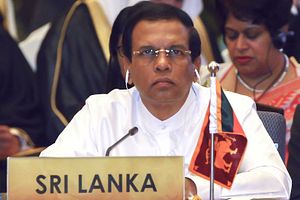In January 2015, the shock electoral defeat of President Mahinda Rajapaksa by his former ally, Maithripala Sirisena, rescued Sri Lanka from a slide into increasingly harsh nationalist authoritarianism. The victory of a broad coalition representing Sinhalese, Tamils, and Muslims gave hope that the country could begin to address its longstanding political challenges: remedying the 60-year failure to grant Tamils a fair share of power in the Sinhala majority island and restoring for all the rule of law, damaged by decades of politicization, bitter ethnic bias, and impunity for grave abuses committed during the civil war with the Tamil Tigers.
The momentum of the early months soon slowed, as deep political dysfunctions reasserted themselves in the face of reforms meant to shake up entrenched political practices and policies. Two years on, the bloom is off. Time is running out for any reform at all. Government leaders should remember how easily they were sidelined when Rajapaksa’s triumphalist majoritarian politics held sway. For their own survival and to deliver on at least some of their big promises, they must collectively reject narrow chauvinistic politics and daily bickering and invest their remaining political capital in promoting an inclusive vision to build a more accountable political order and mitigate the risk of future conflict.
Sirisena’s first nine months as president saw real progress. With his electoral coalition, anchored around the United National Party (UNP), strengthened by the support of a large section of his – and Rajapaksa’s – Sri Lanka Freedom Party (SLFP), he won the needed two-thirds parliamentary approval for a key electoral pledge: a constitutional amendment to reduce the presidency’s enormous powers and restore the independence of oversight commissions for the police, judiciary, and human rights. The government ended censorship and intimidation of the media and partially scaled back the heavy military presence in Tamil-majority areas in the north and east of the island. The military was convinced, reluctantly, to return some of the huge swathes of private land it had seized during and after the war.

































